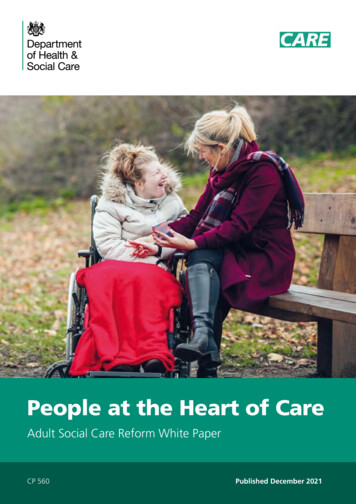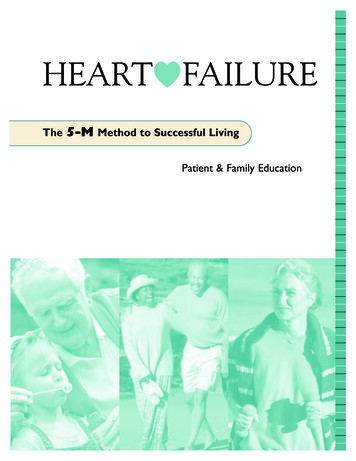
Transcription
People at the Heart of CareAdult Social Care Reform White PaperCP 560Published December 2021
People at the Heart of CareAdult Social Care Reform White PaperPresented to Parliamentby the Secretary of State for Health and Social Careby Command of Her MajestyDecember 2021CP 560
Crown copyright 2021This publication is licensed under the terms of the Open Government Licence v3.0 exceptwhere otherwise stated. To view this licence, visit /version/3.Where we have identified any third party copyright information you will need to obtainpermission from the copyright holders concerned.This publication is also available on our website at www.gov.uk/official-documentsAny enquiries regarding this publication should be sent to us at:ASC.engagement@dhsc.gov.ukISBN 978-1-5286-3015-3E02694149 12/21Printed on paper containing 75% recycled fibre content minimum.Printed in the UK by HH Associates Ltd. on behalf of the Controller of Her Majesty’sStationery Office.
CORRECTION SLIPTitle: People at the heart of care. Adult social care reform white paperSession: 2019 21CP 560ISBN: 978-1-5286-3015-3Correction One:Page 35, Section 4.9 – Text currently reads:We will therefore invest at least 300 million for the period 2022–23 to 2025–26.Text should read:We will therefore invest at least 300 million for the period 2022–23 to 2024–25.Date of correction: 10 December 2021Correction Two:Page 36, Section 4.15 – Text currently reads:Therefore, we will continue to invest in the Care and Support Specialised Housing(CASSH) Fund, with 70 million per year capital funding available per year between2022–23 to 2025–26.Text should read:Therefore, we will continue to invest in the Care and Support Specialised Housing(CASSH) Fund, with 71 million per year capital funding available per year between2022–23 to 2024–25.Date of correction: 10 December 2021
ContentsForeword by the Secretary of State6Executive Summary71. Who cares?92. Our 10-year vision for adult social care133. Strong foundations to build on234. Providing the Right Care, in the Right Place at the Right Time315. Empowering those who draw on care, unpaid carers and families516. Our strategy for the social care workforce657. Supporting local authorities to deliver social care reform and our vision778. Where do we go from here?91Annex A: Engagement on this white paper96Annex B: Carers Action Plan 2018–2020People at the Heart of Care: Adult Social Care Reform White Paper1015
Foreword by theSecretary of StateFor too long successive governments have ignored the challengesfacing adult social care. That changed on 7 September 2021 whenthe Prime Minister set out long overdue reforms for how peoplein England will pay for their social care. From October 2023, noone will be forced to pay unlimited and unpredictable costs fortheir care, giving them the certainty and peace of mind that thisgovernment will step in and look after those most in need ofsupport.How individuals pay for their social care is not the only challengethe sector is facing. That is why today, following the commitmentto system reform in the Prime Minister’s September announcement, we are setting out thenext steps on our social care reform journey. And I stress that it is a journey. The proposalsoutlined will not solve all of the problems, but they are a significant step in moving us towardsa new vision for social care that the whole of government is committed to.For the vast majority of people, care begins at home. Carers play a vital role in ourcommunities and we all owe them a debt of gratitude. And so our vision for adult social careputs people and families at its heart. It is a vision that offers people choice and control overthe care they receive; a vision that promotes independence and enables people to live well aspart of a community; a vision that properly values our exemplary and committed social careworkforce, enabling them to deliver the outstanding quality care that they want to provide;and a vision that recognises unpaid carers for their contribution and treats them fairly.To deliver on this vision I want to encourage investment and innovation right across thesector, to shift away from a reliance on residential care and offer people genuine optionsfor drawing on outstanding care at home and in the community. The new funding for ourworkforce, housing and innovation are just a handful of the proposals that will start to makeour vision a reality.This vision is a shared vision shaped by national and local government, care providers, carestaff, the NHS, and those who draw on care and support and their carers. I am immenselygrateful for the input and support that these groups have provided in developing our visionand the policies within this white paper. I look forward to continuing to work with thesegroups over the months and years ahead.The Right Honourable Sajid Javid,Secretary of State for Health and Social Care6People at the Heart of Care: Adult Social Care Reform White Paper
Executive SummaryThe government is firmly committed to reforming adult social care. We want to acknowledgethe important role of families and friends in caring for one another, whilst also enabling thosewho provide unpaid care to a friend or loved one to be supported to achieve their own lifegoals. We want the adult social care workforce to feel recognised and to have opportunitiesto develop their careers.This white paper, People at the Heart of Care sets out an ambitious 10-year vision for how wewill transform support and care in England.1 Our vision puts people at its heart and revolvesaround three objectives:1. People have choice, control, and support to live independent lives.2. People can access outstanding quality and tailored care and support.3. People find adult social care fair and accessible.Person-centred care is a key theme running through this vision. Genuine choice and controlabout personalised care and support can enhance quality of life and promote independencein a way that matters to individuals. We know that there are already strong examples of ourvision in action, where people can choose the type of care and support that really works forthem, happening in pockets across the country. Therefore, an important part of what wewant to do is make this happen more consistently, so that everyone – no matter where theylive – can benefit.We are not starting from scratch. The Care Act 2014, particularly its focus on wellbeing,provides a strong foundation for our vision. We recognise that the ambition of the Care Acthas not consistently been achieved in the way we would have liked. New measures currentlygoing through Parliament will strengthen how care and support is delivered and give us thetools to ensure we deliver on both the letter and the spirit of the Care Act.To take us further towards our 10-year vision, this document sets out a range of policies thatwe will work with the sector and those who draw on care and support to implement over thenext three years. These include:1 At least 300 million to integrate housing into local health and care strategies,with a focus on increasing the range of new supported housing options available.This will provide choice of alternative housing and support options. At least 150 million of additional funding to drive greater adoption oftechnology and achieve widespread digitisation across social care. Digital tools andtechnology can support independent living and improve the quality of care.Social care is devolved in Wales, Scotland and Northern Ireland.People at the Heart of Care: Adult Social Care Reform White Paper7
Executive Summary At least 500 million so the social care workforce have the right training andqualifications, and feel recognised and valued for their skills and commitment. We wantthe workforce to also have their wellbeing prioritised. A new practical support service to make minor repairs and changes in peoples’homes to help people remain independent and safe in their home, alongside increasingthe upper limit of the Disabilities Facilities Grant for home adaptations such as stairlifts,wetrooms and home technologies. Up to 25 million to work with the sector to kick start a change in the servicesprovided to support unpaid carers. 30 million to help local areas innovate around the support and care theyprovide in new and different ways, providing more options that suit peoples’ needsand individual circumstances. A new national website to explain the upcoming changes and at least 5 million topilot new ways to help people understand and access the care and support available. More than 70 million to increase the support offer across adult social careto improve the delivery of care and support services, including assisting localauthorities to better plan and develop the support and care options available.There are many more things we are doing over the next three years contained in this whitepaper. These proposals are backed by the new Health & Care Levy announced in Septemberthis year, of which 5.4 billion is being invested into adult social care over the next threeyears. Beyond the next three years, an increasing share of funding raised by the levy will bespent on social care in England.Why 10 years? We know that some of the challenges in social care cannot be quickly fixed.Therefore, over the months and years ahead, we will continue working with a range ofvoices from across the care and support landscape to deliver the changes that we all wantto see. This will include working closely with local authorities and supporting them so theyhave the right tools and capability to deliver the right care and support that puts wellbeingand personalised support front and centre. We will also engage with a diverse range oforganisations and people, including those who draw on care and support or provide unpaidcare, to consider how we can measure success of our 10-year vision.8People at the Heart of Care: Adult Social Care Reform White Paper
1Who cares?People at the Heart of Care: Adult Social Care Reform White Paper9
Who cares?1.1 Social care is at the heart of ourcommunities, providing support to thosewho need it so that as many people aspossible can live the life they want tolead. It matters to everybody, yet people’sexperiences of social care – either thosewho draw on formal care and support, theirfamilies, unpaid carers, or the social careworkforce – can vary widely.People who draw on careand support1.2 The scale of social care and supportis vast – affecting the lives of over 10 millionadults of all ages in England2, at any onetime. People draw on care and support indifferent ways and at different stages oftheir life, for example after a hospital stayor discharge from a mental health inpatientfacility. Some people will require supportthroughout their life and become experts intheir own care needs. For others, care needsdevelop suddenly or for others, gradually,and they will have to navigate an unfamiliarlandscape at a uniquely stressful time oftheir life. Some people may only use socialcare for a short period, for example after ahospital stay.1.3 Social care supports adults of allages – including young people moving intoadulthood and those of working age – witha diverse range of needs, including autisticpeople, people with a learning disabilityor physical disability, people with mentalhealth conditions, people with sensoryimpairments, people who experiencesubstance misuse, people with dementia,and other people with long-term conditions.2345101.4 Care and support covers a widerange of activities to promote peoples’wellbeing and support them to liveindependently, staying well and safe. It caninclude ‘personal care’ such as support forwashing, dressing and getting out of bed inthe morning, as well as wider personalisedsupport to enable people to stay engagedin their communities and live their lives inthe way they want. This can include supportto engage in work, training, education,volunteering, or support to socialise withfamily and friends and maintain personalrelationships.1.5 In 2020–21 local authorities receivedover 1.9 million requests for support from1.3 million new clients.3 In total 841,000people were receiving state-funded longterm care in 2020–21.4 Demand for socialcare services will continue to grow as aresult of better diagnosis, higher survivalrates for premature babies and longer lifeexpectancies5. In addition to these longrun trends, the legacy of the COVID-19pandemic on both physical and mentalhealth will also contribute to future demandfor social care.People who providesupport and care1.6 The care and support workforce areour biggest asset. Trusting relationships withcarers provide the bedrock for outstandingsocial care. It is a relationship built over timeand one which gives people confidence thattheir care needs are well understood and willbe consistently met.1.7 There are a huge number of peopleacross the country who provide supportEncompassing those in receipt of formal and informal care, the workforce, and unpaid carers.NHS Digital ‘Adult Social Care Activity and Finance Report” Adult Social Care Activity and Finance Report,England’ - 2020-21, published October 2021NHS Digital, Adult Social Care Activity and Finance Report, England - 2020-21, published October 2021.ONS, ‘National population projections: 2018 based’, published October 2019.People at the Heart of Care: Adult Social Care Reform White Paper
Who cares?and care. Over 1.5 million individuals –representing 4.6% of the 32.4 millionpeople employed in England6 – work inpartnership with families and communitiesacross the country to provide support andcare. The workforce covers care workers,personal assistants, social workers,occupational therapists, registered nurses,housing support workers, and those inmanagerial roles among others.1.8 We rely on the crucial contribution ofthose who provide to a family member, friendor neighbour7, either in part or totality. Wewill continue to celebrate and support theamazing work they do. This encompassesa diverse range of people, whose roles maydiffer; for example young or older carers,carers of people with dementia or for peoplewho have suffered a stroke, employed carersproviding a high volume of care per week oreconomically inactive carers. Unpaid care isprovided by people of all ages. Many carershave jobs and other caring responsibilities.Carers are people who often have their ownjobs, life pressures and things that matter tothem. We know that the support providedby unpaid carers is often physically andemotionally demanding, with consequencesfor carers’ own health and wellbeing. Whilstmany carers enjoy caring for their loved one, itshould not define them unless they wish it to.This white paper1.9 On 7 September 20218 we announced 5.4 billion over 3 years solely for adult socialcare reform. At the Spending Review inOctober9, we announced that this investmentwill be used for the following areas:6789 3.6 billion to pay for the cap on carecosts, the extension to means test, andsupport progress towards local authoritiespaying a fair cost of care which togetherwill remove unpredictable care costs 1.7 billion to improve across social carein England, including at least 500 millioninvestment in the workforce1.10 This white paper describes ourpriorities for investment in social care anddescribes where the money will be used.This investment in adult social care is beingfunded from the new Health and Social CareLevy. As we implement the cap on care costsand remove the unpredictable care costspeople can face, the proportion of the levythat is required to support investment inadult social care in England will increase.1.11 Today, we outline an ambitiousstrategy of reform that will touch on allthose who interact with adult social care,whether that’s those who draw on supportand care, unpaid carers, the care andsupport workforce, care providers bothlarge and small and for and not for profit,local authorities, voluntary organisationsand others.1.12 This white paper is the product ofextensive engagement with the adult socialcare sector, and we are grateful to thehundreds of organisations and individualswho have contributed to its development(Annex A). We are particularly grateful toThink Local Act Personal and the Healthand Wellbeing Alliance for facilitatingdirect engagement with people with livedexperience of care and support, whoseviews are so important in getting reformright. No significant reform can be achievedONS, ‘Employment in the UK: September 2021’, published September 2021.At the time of the 2011 Census, there were over 5.4 million people providing unpaid care in England. The2021 Census will provide an updated count of the number of people providing unpaid care in England.BGOV.UK, published September 2021HMT, ‘Autumn Budget and Spending Review 2021’, published October 2021.People at the Heart of Care: Adult Social Care Reform White Paper11
Who cares?by central government alone, and we lookforward to continuing to work with thelocal authorities, think tanks, professionalbodies, charities, care providers, unions andpeople with experience of care to deliver thiswhite paper.1.13 The remainder of this documentstarts by outlining our 10-year vision foradult social care (chapter 2), followed bya summary of opportunities that we wantto build on to achieve our vision (chapter3). We then set out a number of policychapters that will move us towards achievingour vision, covering areas such as housing,technology and embedding innovation(chapter 4); how we can empower thosewho draw on support and care, unpaidcarers and families (chapter 5); and ourstrategy for the social care workforce(chapter 6). Finally, we explain how we willmake sure the proposals in this white paperare effectively delivered to support our vision(chapter 7).1.14 This white paper forms a centralcomponent of the government’s vision toensure that disabled people of all ages, boththose with physical and hidden disabilities,have the opportunity to live full and happylives in their communities. It follows on fromthe recent publication of our all-age nationalautism strategy10 and the National DisabilityStrategy11, which set out specific actions tolevel up support for disabled people andautistic people across the country.1.15 This white paper also precedes theforthcoming publication of a standalonestrategy focused on those living withdementia and their carers.10 DfE and DHSC, ‘The national strategy for autistic children, young people and adults: 2021 to 2026’,published July 2021.11 DWP, ‘National Disability Strategy’, published July 2021.12People at the Heart of Care: Adult Social Care Reform White Paper
2Our 10-year vision foradult social carePeople at the Heart of Care: Adult Social Care Reform White Paper13
Our 10-year vision for adult social care2.1 People are at the heart of our visionfor adult social care. No matter where theylive, their age, race, culture, religious beliefs,sex, sexual orientation, gender identity,disability, housing status or their personalcircumstances. This white paper thereforefocusses on people and outcomes, not justthe systems behind them.2.2 The government is committed toreforming adult social care across the wholeof England, and our 10-year vision sets outour long-term aspirations for how peoplewill experience care and support. This hasa particular focus on three key objectives:how we will support people to have choice,control and independence; how we willprovide an outstanding quality of care; andhow we will ensure that care is provided ina way that is fair and accessible to everyonewho needs it.2.3 This vision has been co-developedwith the sector. We have engaged directlywith people who draw on care and supportand unpaid carers, and it has been shapedby what they have told us they need toenable them to live the fulfilling lives thatthey choose.2.4 The starting point for our vision isembedding personalised care, which is vitalto providing the user-led social care weenvisage. It has been proven to improveoutcomes and enhance quality of life,enabling people to take the level of controland responsibility that they feel comfortablewith. Fundamentally, it recognises a personas an individual with specific needs, wishesand aims. It is our ambition to makepersonalisation the expected standard andfor high-quality personalised care to be thenorm across health and care. Our 10-yearvision describes how this will look and feelfor people who draw on care and support,and the steps we will take to achieve this.14 PeoplePeoplehave choice,control, and supportto live independentlives2.5 People who draw on care andsupport have told us that the core purposeof adult social care should be to help themto maintain or gain their independence,allowing them to have control over theirlives. Rather than focusing on approachesto delivering care that intervene at a timeof crisis, care and support services shouldintervene early to support individuals,helping people retain or regain their skillsand confidence, and prevent needs fromdeveloping. When care supports people‘sindependence it allows them to have realchoice and control over the things thatmatter, enabling them to live healthier,happier, and more fulfilling lives in the placethat they choose.2.6 In parts of the country wherecommunities, the voluntary sector, localauthorities, and providers are workingtogether with people who draw on careand support to develop new, collaborativeapproaches to delivering care, we cansee this vision already coming to life. Byinvesting in preventative services, increasingthe care and support options available, andproviding the right information and advice toallow people to plan for the future, we canenable people to remain in their own homesand communities for longer and achieve theoutcomes that matter to them.2.7 We must embed this best practiceacross the country so everyone can reapthe benefits. These methods also have thepotential to deliver improvements in servicedelivery and greater efficiency in the future.People at the Heart of Care: Adult Social Care Reform White Paper
Our 10-year vision for adult social care2.8 We want greater choice, control, and independence to mean that someone whodraws on care and support can say: I can live as part of a community, where I am connected to the people who areimportant to me, including friends and family, and I have the opportunity to meetpeople who share my interests. I lead a fulfilling life with access to support, aids and adaptations to maintain andenhance my wellbeing. I am valued for the contribution I make to my community and feel supported toachieve my goals. I can live in my own home, with the necessary adaptations, technology, and personalsupport as designed by me, to enable me to be as independent as possible. I have a good choice of alternative housing and support options, so I am able tochoose where I live and who I live with, with the opportunities to plan ahead, and takeup those options in a timely fashion. I have control over my care and support, including what services I receive and how,when and where my care is provided, with access to the necessary information andadvice to help me make these decisions and plan for the future.2.9 Choice, control, and independence are not limited to those who draw on care andsupport. We know that families and unpaid carers must be supported. Therefore, wewant unpaid carers to be able to say: I am supported to provide care as I wish and do so in a way that takes into account myown access to education, employment, health and wellbeing. I have a life outside of caring and I am able to remain connected to the people whomatter to me. I know my needs are equally recognised and my goals and aspirations are respectedand fulfilled. I have the right information and advice to be able to make informed decisions. I have access to appropriate support that suits my needs, including respite care andcarers breaks.People at the Heart of Care: Adult Social Care Reform White Paper15
Our 10-year vision for adult social care2.10 To ensure everyone is provided with greater choice, control and independence, thegovernment, the NHS, local authorities, care providers, voluntary and community groupsand the wider sector will work together to: Ensure people can adapt their homes and access practical tools and technology, inorder to live independently and live well in their own home. Make sure that people can access a range of personalised support that reflects theirown choices and circumstances – including finding new approaches to improve on theways we have traditionally delivered care and support. Ensure that the opportunity to receive help as a direct payment is understood, withencouragement and support to be able to use it flexibly and innovatively to provide thegreatest benefits for each individual. Help people to achieve the outcomes that matter to them, by promoting wellbeing andsupporting equitable participation in work, community, and other activities. Ensure care and support decisions are co-designed with people and their unpaidcarers, working with them as equal partners and combining respective knowledge andexperience to support joint decision making. Champion early health and wellbeing interventions through community support to delayand prevent care needs and reduce the number of people with preventable diseases.Choice, control and independence in action: Charlotte’s storyCharlotte (changed name) is 46 and lives at Hill House in Cheshire. Following a stroke,Charlotte has limited mobility and often finds it difficult to make herself understood. LeonardCheshire’s Assistive Technology team has been working with Charlotte to identify the bestnew innovative technologies to help her communicate.Charlotte has been given an iPad which has been a revelation. A special mount, which sitson the floor of Charlotte’s room, enables her to use the device from her wheelchair using aspecially crafted stylus. Through a series of taps, Charlotte can type words, navigate socialmedia websites, and read dozens of electronic books in the Kindle app.Charlotte is also involved in pilot-testing a technology which teaches Amazon Alexa torecognise her speech so that she can control lamps, technology, and a tabletop fan witheither her voice or the app’s touch interface.Charlotte can maintain a close relationship with her family by video calling her children andparents without needing to wait for a staff member to be available to facilitate the dialling orholding the phone for her. These communication devices have given Charlotte access to, andcontrol over, her environment which she hasn’t had in years.Leonard Cheshire is in the second year of a three-year assistive technology project introducingresidents and staff to technologies that are transforming their day to day lives – leading toincreased confidence, greater control over their space and time, and wider social inclusion.16People at the Heart of Care: Adult Social Care Reform White Paper
Our 10-year vision for adult social care PeoplePeoplecan accessoutstanding qualityand tailored careand support2.11 Whilst safety, protection from abuseand neglect, and delivering the appropriatestandards of care are vitally important,services must go beyond these basicrequirements, and promote an individual’swider wellbeing. Therefore, care and supportshould be bespoke to individuals, buildingon their strengths and enabling them toachieve the outcomes that matter to them.2.12 We believe an outstanding quality ofcare should be of a standard that anyonewould be happy for their own child, partner,close friend, parent, grandparent, or otherfamily member to receive – no matter whereyou live in the country. Health and careprofessionals should work together withpeople who draw on care and support, andtheir families, to achieve this aim.2.13 We want outstanding quality and personalised support to mean that someonewho draws on care and support can say: I receive care and support that is safe, responsive to my needs and respects my rights. I receive personalised and inclusive support, where the people who care for me knowme as an individual and recognise me as having unique strengths, and aspirations andknow that my background, values and requirements are unique to me. I am supported by a workforce who have the right training, qualifications and values,and are concerned about what matters to me. I receive care from a workforce whose careers are valued and whose professionaldevelopment and wellbeing are prioritised. I experience a seamless care journey, where health and care services are joined-uparound me and I only have to tell my story once. I receive care and support that is co-ordinated, and everyone works well together andwith me to plan my care, bringing together services to achieve the outcomes that areimportant to me. I know that if I want, I can receive help as a direct payment instead of having careservices organised for me, and that I will be encouraged and supported to usemy direct payment in whatever way will best suit my own needs and achieve myoutcomes. I can make the last stage of my life as good as possible because everyone workstogether confidently, honestly, and consistently to help me and the people who areimportant to me, including those who care for me.People at the Heart of Care: Adult Social Care Reform White Paper17
Our 10-year vision for adult social care2.14 The care and support workforce arecentral to achieving this vision. Our ambitionis that we create a qualified and valuedworkforce that works together, with peoplewho draw on care and support and withother organisations, including the NHS,to deliver outstanding quality care that issensitive to individual needs.We therefore want someone who works in adult social care to be able to say: Social care is a rewarding career with clear opportunities to develop and progress, andwhere I
10 People at the Heart of Care: Adult Social Care Reform White Paper Who cares? 1.1 . Social care is at the heart of our communities, providing support to those who need it so that as many people as possible can live the life they want to lead. It matters to everybody, yet people's experiences of social care - either those











